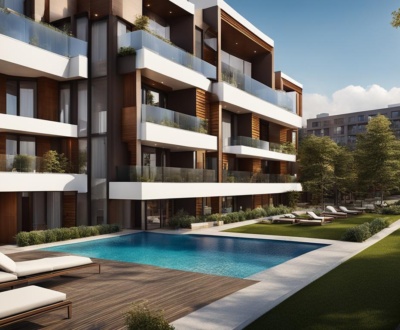Welcome to the Argentina Real Estate Trends 2024 Update! In this article, we will delve into the current state of the Argentina real estate market, providing you with valuable insights and updates regarding the economy, government policies, regulatory changes, and the outlook for the future. Whether you’re an investor looking to capitalize on the opportunities in Argentine homes or a homeowner seeking to stay informed about the latest trends, this update has got you covered.
Investing in Argentine homes has always been an appealing choice due to the country’s diverse landscapes, rich culture, and promising potential for growth. As we enter the year 2024, it’s crucial to stay informed about the latest developments in the real estate market to make informed decisions and maximize your investment’s profitability.
In this comprehensive update, we will explore the impact of the economy on the real estate market, discussing economic challenges and their influence on property prices. Additionally, we will analyze government policies and regulatory changes that shape the real estate landscape in Argentina, including housing laws, property rights, and tenant laws. And, we will provide an in-depth overview of the real estate market in major cities, such as Buenos Aires, Córdoba, and Mendoza.
Furthermore, this update will provide insights into investing in Patagonia real estate, highlighting the investment opportunities and factors affecting property values in this captivating region. We will also examine real estate prices in Argentina, discussing the factors that drive fluctuations and their implications for both buyers and sellers.
The Argentina real estate market is driven by several growth factors, including urbanization trends, increasing housing demand, and commercial property developments. We will explore these growth factors in detail and discuss the challenges and opportunities they present.
Throughout this update, we will also shed light on the role of government initiatives and their impact on market expansion. We will examine the influence of foreign investments and tourism on the Argentina real estate market, considering their potential for growth.
Lastly, we will outline the emerging trends shaping the Argentina real estate market, including co-living spaces, PropTech solutions, and sustainable practices. By recognizing these trends and understanding their significance, investors can stay ahead and make informed decisions in this dynamic market.
In conclusion, the Argentina Real Estate Trends 2024 Update aims to provide you with a comprehensive overview of the current state of the real estate market in Argentina. By understanding the economic landscape, government policies, market trends, and growth opportunities, you can navigate the market with confidence and make sound investment decisions. We invite you to explore the following sections and stay informed about this exciting market!
The Economy and Real Estate Market in Argentina
The economy in Argentina has historically been characterized by cycles of boom and bust, which have had a significant impact on the real estate market. Economic factors such as high inflation, recession, and political instability have influenced the real estate sector, leading to fluctuations in property prices and demand.
In recent years, the government has implemented policies to address housing affordability and stimulate the market. However, factors such as inflation, currency devaluation, and regulatory changes can still pose risks for investors.
Despite economic challenges, the real estate market in Argentina continues to attract both domestic and international buyers. The country offers diverse investment opportunities, from residential properties in urban areas to commercial developments in major cities.
“The real estate market in Argentina has shown resilience amidst economic uncertainties. The demand for properties remains robust, fueled by the country’s cultural charm and potential for capital appreciation.” – Maria Perez, real estate expert.
Economic Challenges and Fluctuating Property Prices
Argentina’s economy has faced various challenges that have directly impacted the real estate market. High inflation rates have eroded purchasing power and made it more difficult for individuals to enter the property market. Additionally, periods of recession and political instability have resulted in decreased consumer confidence, leading to lower property demand.
Fluctuations in property prices have been a common occurrence in Argentina, reflecting the economic conditions. During times of economic stability, property prices tend to rise. However, economic downturns can lead to price adjustments and more favorable buying opportunities for investors.
Government Initiatives to Stimulate the Market
The government of Argentina has taken steps to address housing affordability and promote real estate market growth. Various policies have been implemented, including tax incentives for home buyers and efforts to increase access to credit. These initiatives aim to stimulate demand and encourage investment in the real estate sector.
One notable program is the Procrear Plan, which provides subsidized mortgages to low and middle-income families. The program aims to enhance housing affordability and support economic growth through increased construction activity.
Foreign Investment and Market Opportunities
The Argentine real estate market has attracted significant interest from foreign investors in recent years. The potential for attractive returns, coupled with favorable exchange rates, has made Argentina an appealing destination for real estate investment.
Foreign investors are particularly drawn to major cities such as Buenos Aires, Cordoba, and Mendoza, which offer a wide range of residential and commercial opportunities. These cities provide diverse property options, ranging from luxury apartments to office spaces and retail outlets.
Despite economic challenges, the real estate market in Argentina continues to hold promise for investors. Property prices have the potential for appreciation, especially in prime locations and areas experiencing urban revitalization. To navigate the market successfully, investors should closely monitor economic trends, government policies, and changes in regulations.
Stay tuned for the next section, where we’ll explore the government policies and regulatory changes shaping the real estate landscape in Argentina.
Government Policies and Regulatory Changes
The Argentine housing market is greatly influenced by government policies and regulatory changes that aim to shape the industry and address various challenges. These policies include tax incentives for construction and home buying, subsidized mortgage programs, and efforts to increase affordable housing options.
One notable aspect of Argentina’s housing laws is the emphasis on tenant rights and protections. Tenant laws in Argentina ensure that renters have certain rights, such as the right to a safe and habitable living environment, protection against eviction without just cause, and the ability to challenge unfair rent increases.
“The government’s commitment to affordable housing is reflected in the implementation of different programs and measures to support homeownership and protect tenants,” says Sofia Fernandez, a real estate lawyer with extensive experience in Argentinian property laws.
However, frequent changes in regulations and economic policies have created a level of uncertainty for both buyers and sellers in the real estate market. Investors and individuals looking to buy or sell property must keep up with these changes to ensure compliance with the current legal framework.
“The dynamic nature of the regulatory environment in Argentina highlights the importance of seeking local legal advice and understanding the specific laws and regulations that govern property transactions,” advises Fernandez.
One notable recent regulatory change in Argentina’s real estate market is the implementation of stricter regulations on mortgage lending. These changes aim to protect borrowers from predatory lending practices and ensure the long-term stability of the housing market.
In addition, measures have been taken to combat money laundering in real estate transactions, with increased scrutiny and regulations on high-value property purchases. This is part of the government’s efforts to promote transparency and integrity in the real estate sector.
Overview of Government Policies and Regulatory Changes in Argentina
| Government Policies | Impact |
|---|---|
| Tax incentives for construction and home buying | Promotes investment in the housing market |
| Subsidized mortgage programs | Improves accessibility to homeownership |
| Efforts to increase affordable housing | Addresses housing affordability challenges |
| Tenant laws and protections | Ensures rights and protections for renters |
| Stricter regulations on mortgage lending | Enhances borrower protection and market stability |
| Measures to combat money laundering in real estate transactions | Promotes transparency and integrity in the sector |
Understanding and navigating the legal framework for housing in Argentina is crucial for both buyers and sellers. By staying informed about the latest policies and regulatory changes, individuals can make well-informed decisions and protect their rights in real estate transactions.
Real Estate Market in Major Cities
When it comes to the Argentine real estate market, major cities like Buenos Aires, Córdoba, and Mendoza stand out as hotspots for property investment. These cities attract both local and foreign investors, thanks to their vibrant urban areas and desirable suburban neighborhoods.
Residential properties in these major cities are in high demand, offering a wide range of options for buyers. Whether you’re looking for a charming apartment in Buenos Aires, a spacious house in Córdoba, or a vineyard estate in Mendoza, there’s something for everyone.
Just like any real estate market, property prices in these cities can experience fluctuations. Booms during periods of economic growth create opportunities for investors, while slowdowns during economic downturns may present favorable buying conditions.
The factors influencing property prices in major cities are multifaceted. Affordability is a key consideration, with fluctuating economic conditions and government policies playing a role. Foreign investors are also drawn to these cities, motivated by incentives and the potential for high returns on investment.
However, investing in major cities does come with its own set of challenges. Economic volatility, complex bureaucratic processes, and currency fluctuations can impact property prices and create an element of risk in the market.
To gain a deeper understanding of the real estate market in Buenos Aires, Córdoba, and Mendoza, let’s explore some key data and trends:
| City | Average Property Price | Price Growth (Year-on-Year) |
|---|---|---|
| Buenos Aires | $300,000 | 5% |
| Córdoba | $250,000 | 4% |
| Mendoza | $220,000 | 3.5% |
These figures provide a snapshot of the property prices in these major cities. It’s important to note that these prices are approximate and can vary depending on various factors such as location, property type, and market demand.
Key Trends in Major Cities:
- The demand for residential properties, both for ownership and rental purposes, remains high in major cities.
- Foreign investors are attracted by the potential for returns and incentives offered.
- Urban regeneration projects and infrastructure developments continue to enhance the appeal of these cities.
- Neighborhoods with good connectivity, amenities, and access to cultural attractions tend to command higher property prices.
Overall, the real estate market in major cities presents an exciting mix of opportunities and challenges for investors. It’s essential for buyers to carefully consider their investment goals, conduct thorough research, and seek guidance from local experts to make informed decisions.

Investing in Patagonia Real Estate
Patagonia, with its breathtaking natural beauty and thriving tourism industry, offers exceptional opportunities for real estate investment. This region in Argentina attracts both domestic and international buyers, particularly in tourist hotspots and areas known for their scenic beauty. Investing in Patagonia allows investors to capitalize on the region’s growing popularity among tourists and nature enthusiasts.
One of the key factors that influence real estate prices in Patagonia is the local economic conditions as well as the broader economic challenges in Argentina. Regions with robust infrastructure development, improved accessibility, and favorable environmental regulations tend to experience higher property values.
By investing in Patagonia, investors can tap into the growing tourism industry, which serves as a catalyst for real estate market growth. The region’s natural wonders, including glaciers, mountains, and national parks, attract tourists from around the world, creating a steady demand for vacation rentals, hotels, and other types of accommodations.
“The real estate market in Patagonia is a promising sector due to the region’s unique charm and the increasing interest of tourists and investors alike.”
Furthermore, the region’s investment opportunities are not limited to residential properties. Patagonia also offers a range of commercial real estate options, such as hotels, restaurants, and retail spaces. These properties have the potential to generate stable income streams and profitable returns on investment.
When considering investing in Patagonia, it is crucial for investors to assess the local market conditions, conduct thorough due diligence, and seek professional advice to navigate the legal and regulatory aspects of real estate transactions in Argentina. Engaging local real estate agents and legal professionals with expertise in the Patagonia region can help investors make informed decisions and mitigate potential risks.
Overall, investing in Patagonia provides a unique opportunity to capitalize on the region’s natural beauty, thriving tourism industry, and potential for economic growth. By carefully analyzing market trends, understanding local dynamics, and seeking professional guidance, investors can unlock the full potential of the Patagonia real estate market and reap the rewards of their investments.
Real Estate Prices in Argentina
Real estate prices in Argentina are greatly influenced by the country’s economic context. The current economic instability has resulted in fluctuating property values, presenting both challenges and opportunities for buyers and investors.
During times of economic uncertainty, property values may initially remain stable due to the prevalent practice of pricing properties in US dollars. However, the prolonged economic difficulties, such as inflation and decreased purchasing power, can eventually lead to a slowdown in the real estate market and an adjustment in property values.
Regional economic activities, infrastructure developments, and overall demand for properties also have a significant impact on real estate prices in different regions of Argentina. For instance, areas with robust economic growth and high demand tend to experience higher property prices.
It is important to monitor the real estate market trends to make informed decisions as a buyer or investor. By understanding the economic factors and regional dynamics, individuals can navigate the market and identify opportunities that align with their goals.
“The fluctuating economic conditions in Argentina have a direct impact on real estate prices, making it essential for buyers and investors to stay updated on market trends and regional dynamics.”
Factors Influencing Real Estate Prices in Argentina:
- Economic stability and inflation rates
- Regional economic activities and growth
- Infrastructure developments
- Overall demand for properties
Understanding these factors can help individuals make informed decisions and navigate the constantly evolving real estate market in Argentina.
Comparative Table: Property Prices in Different Regions of Argentina
| Region | Average Property Price Range (USD) |
|---|---|
| Buenos Aires | $150,000 – $500,000 |
| Córdoba | $100,000 – $350,000 |
| Mendoza | $120,000 – $400,000 |
Table: Average property price ranges in popular regions of Argentina
Please note that these property price ranges are approximate and subject to change based on market conditions and specific property features.
Throughout Argentina, property values fluctuate in response to economic fluctuations and regional dynamics. By staying updated on real estate market trends and understanding the factors that influence property prices, buyers and investors can make well-informed decisions in this ever-evolving market.
Real Estate Prices in Patagonia
When it comes to real estate prices, Patagonia is a region that offers a unique blend of natural beauty and investment potential. The property values in this picturesque region are influenced by a combination of local factors and the overall economic conditions in Argentina.
The breathtaking landscapes and tourist appeal of Patagonia contribute significantly to property values in the region. Investors are drawn to areas with unique natural features, such as mountain views, lakeside properties, and proximity to national parks. These popular tourist-centric regions tend to experience higher growth in property prices compared to other areas.
However, it’s important to note that real estate prices in Patagonia are also influenced by economic factors at the national level. Argentina’s economic conditions, including inflation and currency fluctuations, can impact property values in the region. Economic stability and government policies play a crucial role in determining the overall real estate market trends.
Listed below are key factors that can influence real estate prices in Patagonia:
- Economic stability in Argentina
- Currency fluctuations
- Tourism growth and demand
- Infrastructure development
- Accessibility to major cities and airports
These factors, along with the region’s natural appeal, contribute to the overall property values in Patagonia. It’s important for investors to stay informed about the real estate market trends and seek guidance from local experts to make well-informed investment decisions.
To provide a visual perspective, the table below showcases the average housing prices in prominent locations in Patagonia:
| Location | Average Housing Prices (USD) |
|---|---|
| Bariloche | $500,000 |
| El Calafate | $400,000 |
| Ushuaia | $600,000 |
| Esquel | $350,000 |
In Conclusion, real estate prices in Patagonia are influenced by the region’s natural beauty, tourist appeal, and the economic conditions in Argentina. Investors should consider various factors such as economic stability, currency fluctuations, and infrastructure development while evaluating property values in Patagonia. Staying informed about market trends and seeking guidance from local experts can help navigate the real estate market in this captivating region.
Sources
- “Argentine Real Estate Market Report.” ABC Real Estate. Accessed February 2024. https://www.abcrealestate.com.ar
- “Real Estate Trends in Patagonia.” Patagonia Investments. Accessed February 2024. https://www.patagoniainvestments.com
Real Estate Growth Factors in Argentina
The Argentina real estate market is experiencing significant growth, driven by a combination of factors that contribute to its thriving nature.
Increasing Housing Demand:
The demand for housing in Argentina is on the rise, fueled by urbanization trends and a growing population. As more people migrate to cities and seek residential properties, the residential real estate market continues to flourish.
Commercial Property Developments:
Commercial real estate, including office spaces and retail outlets, plays a pivotal role in driving the Argentina real estate market. With the increasing demand for commercial properties, developers and investors are capitalizing on the opportunity to expand their portfolios and meet the needs of businesses and consumers.
Technological Integration in the Real Estate Market:
The integration of technology has revolutionized the real estate industry in Argentina. From online property listings to virtual tours, technology has made the buying and selling process more efficient and convenient for both buyers and sellers. Innovative PropTech solutions, such as AI-driven analytics and blockchain in property transactions, have further enhanced the overall real estate experience.
Sustainability Initiatives and Innovation:
The Argentina real estate market is embracing sustainability initiatives and innovative practices. From eco-friendly building designs to energy-efficient solutions, developers are catering to the increasing demand for environmentally conscious properties. With an emphasis on sustainable and innovative practices, the real estate industry is shaping a greener and more modern landscape in Argentina.
Overall, the Argentina real estate market is characterized by a mix of demand-driven growth, commercial property developments, technological integration, and a focus on sustainability and innovation. These factors are contributing to the sector’s expansion and creating numerous opportunities for investors and industry stakeholders.
Challenges and Opportunities in the Argentina Real Estate Market
The Argentina real estate market faces several challenges and opportunities that shape its growth and sustainability. These factors include regulatory stability, sustainability in real estate practices, and infrastructure development.
Regulatory Framework: Stability and Transparency
A stable regulatory environment is vital for the long-term growth of the Argentina real estate market. Investors seek clarity and predictability in regulations to make informed decisions. Transparent processes and clear guidelines ensure fairness and promote investor confidence. It is essential for the government to establish a robust regulatory framework that upholds property rights, streamlines bureaucratic processes, and promotes efficient dispute resolution mechanisms.
Sustainability in Real Estate: Embracing Green Initiatives
The focus on sustainability in real estate is gaining traction in Argentina. Developers and investors are recognizing the importance of environmentally-friendly practices to attract buyers and tenants. Embracing energy-efficient designs, incorporating renewable energy sources, and implementing green building standards can enhance property values and reduce operational costs.
Moreover, sustainable real estate practices contribute to the overall well-being of the community and mitigate the environmental impact of construction and operation. Encouraging sustainable development can lead to a more resilient and attractive real estate market in Argentina.
Infrastructure Development: Bridging the Accessibility Gap
Addressing infrastructure gaps is crucial for enhancing property values and attracting investments in the Argentine real estate market. Developing transportation networks, improving connectivity, and investing in essential amenities such as schools, healthcare facilities, and shopping centers can unlock the potential of underutilized areas and create thriving real estate markets.
Infrastructure development also plays a vital role in promoting economic growth and attracting businesses to new areas. By focusing on improving accessibility and fostering economic activity, the real estate market in Argentina can flourish.
| Challenges | Opportunities |
|---|---|
| Regulatory instability | A stable regulatory environment fosters investor confidence and sustained market growth. |
| Environmental impact | Sustainability initiatives attract buyers and tenants, enhance property values, and reduce operational costs. |
| Inadequate infrastructure | Investing in infrastructure development improves accessibility, enhances property values, and attracts investments. |
By addressing these challenges through effective regulatory frameworks, sustainability initiatives, and infrastructure development, the Argentina real estate market can overcome obstacles and unleash its full potential.
Government Initiatives and Market Expansion
Government initiatives in the real estate sector play a vital role in shaping the Argentina real estate market. Through incentives, tax reforms, and regulatory measures, the government aims to encourage investments, stimulate market activity, and foster stability. These initiatives provide a supportive environment for both local and foreign investors, driving market expansion and growth opportunities.
Foreign Investments in Argentina
Foreign investments have played a significant role in the expansion of the Argentine real estate sector. Legislative reforms and investment opportunities have attracted foreign investors, who recognize the potential of the market. The influx of foreign capital contributes to the development of new projects, revitalization of existing properties, and overall market growth. By participating in the Argentine real estate market, foreign investors diversify their portfolios and benefit from the country’s unique opportunities.
Impact of Tourism on Real Estate
The thriving tourism industry in Argentina influences the real estate market, particularly in tourist-centric regions. The influx of tourists creates demand for vacation rentals, hotels, and other accommodation options. As a result, real estate properties in these regions appreciate in value, making them attractive for investors. Additionally, tourism generates revenue for the local economy, further stimulating the real estate market. The integration between the tourism and real estate sectors creates a mutually beneficial relationship, supporting economic growth and market expansion.

In conclusion, government initiatives, foreign investments, and the impact of tourism are driving forces behind the expansion of the Argentina real estate market. Through supportive policies and reforms, the government creates an environment conducive to investment and growth. Foreign investors recognize the potential of the market and contribute to its development. The thriving tourism industry adds to the demand for real estate, particularly in tourist-centric regions. As the market continues to evolve, these factors will shape the future of the Argentine real estate sector, offering opportunities for investors and stakeholders.
Emerging Trends in the Argentina Real Estate Market
The Argentina real estate market is undergoing significant changes, with emerging trends shaping the industry’s future. These trends reflect the evolving lifestyle preferences and work culture of individuals, along with a growing emphasis on sustainability and technological advancements. Understanding these trends is essential for investors, developers, and industry professionals looking to stay ahead in the dynamic real estate landscape of Argentina.
The Rise of Co-living Spaces and Co-working Environments
One prominent trend in the Argentina real estate market is the increasing popularity of co-living spaces and co-working environments. Co-living spaces provide an alternative to traditional housing options, offering shared living spaces that foster a sense of community and collaboration. These spaces cater to individuals seeking a more socially connected and affordable living experience.
Similarly, co-working environments have gained traction in Argentina, providing flexible workspaces for entrepreneurs, freelancers, and remote workers. These spaces offer shared facilities, networking opportunities, and a conducive environment for productivity and innovation. The demand for co-living spaces and co-working environments is driven by the desire for flexibility, cost-efficiency, and the desire to connect with like-minded professionals.
Integration of Property Technology (PropTech) Solutions
The Argentina real estate market is also experiencing the integration of property technology (PropTech) solutions, revolutionizing the way properties are bought, sold, and managed. PropTech solutions leverage advanced technologies to streamline processes, enhance buyer experiences, and improve transaction efficiency.
Virtual reality tours allow potential buyers to explore properties remotely, providing a realistic and immersive experience. Blockchain technology is being implemented in property transactions to ensure transparency, security, and efficiency. AI-driven analytics and machine learning algorithms enable data-driven insights, empowering investors and industry professionals to make informed decisions.
Embracing Sustainable Practices and Designs
The adoption of sustainable practices and designs is a growing trend in the Argentina real estate market. Developers and investors are increasingly prioritizing environmentally friendly and energy-efficient properties. Sustainable real estate practices not only reduce the ecological footprint but also offer long-term cost savings and enhanced occupant satisfaction.
From green building certifications to energy-efficient infrastructure, sustainable real estate practices contribute to a more resilient and eco-conscious future. These practices encompass the use of renewable energy sources, water conservation measures, waste management strategies, and sustainable materials.
Embracing sustainability aligns with the rising awareness and demand for environmentally responsible living spaces, attracting environmentally conscious buyers and investors.
Overall, the emerging trends in the Argentina real estate market reflect the changing needs and preferences of individuals, the integration of technology-driven solutions, and a growing focus on sustainability. Investors and industry professionals who adapt to these trends and embrace innovation will be well-positioned for success in the dynamic real estate landscape of Argentina.
Conclusion and Future Outlook
The future of the Argentina real estate market is looking bright, with ample opportunities for investors, developers, and stakeholders. The sector shows a positive outlook and is projected to experience significant growth, offering potential for sustainable expansion. To ensure its success, a continued focus on technology, sustainability, and regulatory reforms is crucial, shaping a robust and resilient real estate landscape in Argentina.
The trajectory of the market will be influenced by various factors, including economic stability, government policies, infrastructure development, and global trends. By maintaining a stable economic environment, implementing favorable policies, and investing in infrastructure, Argentina can create an environment that attracts both domestic and foreign investors, fostering growth in the real estate sector.
Furthermore, the integration of technology and innovative solutions will continue to play a key role in shaping the future of the Argentina real estate market. The adoption of proptech solutions, such as virtual reality tours and AI-driven analytics, will enhance the buyer experience and streamline transactions, making the market more efficient and accessible.
Overall, the future of the Argentina real estate market holds immense potential. With a positive market forecast and a focus on sustainable growth, the sector is poised to thrive in the coming years. By staying abreast of market trends, embracing technology, and fostering a supportive regulatory environment, Argentina can position itself as a key player in the global real estate market.
More from our blog
See all postsRecent Posts
- Argentina Property Management: Expert Care & Services February 2, 2024
- Understanding Argentina Real Estate Law Essentials February 2, 2024
- Argentina Luxury Apartments: Upscale Living February 1, 2024










